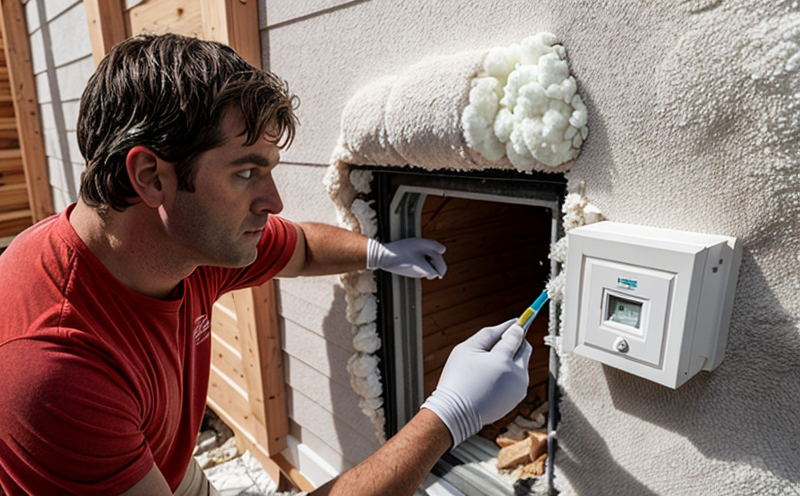EN 1604 Compressive Strength and Thermal Behavior
The EN 1604 standard provides a comprehensive framework for evaluating the compressive strength and thermal behavior of insulation materials used in building and infrastructure projects. This service is particularly critical for ensuring that insulating materials meet stringent quality requirements, thereby enhancing the energy efficiency and durability of construction projects.
The compressive strength test according to EN 1604 assesses a material's ability to withstand mechanical loads without undergoing significant deformation or failure. This property is crucial in determining the reliability of insulation products when subjected to various environmental conditions such as temperature fluctuations, humidity, and physical stresses during installation and use.
Thermal behavior testing evaluates how well an insulating material maintains its thermal properties over time. The standard specifies detailed procedures for conducting these tests under controlled laboratory conditions. This ensures that the results are reliable and comparable across different materials, allowing for accurate comparisons in terms of their performance and longevity.
The test methods outlined in EN 1604 are designed to simulate real-world conditions as closely as possible. For instance, specimens are subjected to specific load cycles and environmental factors like temperature changes. This approach helps identify any potential weaknesses or vulnerabilities that might compromise the insulating capacity of materials under actual operating conditions.
Quality managers and compliance officers rely heavily on this testing service to ensure they meet regulatory standards and industry best practices. By leveraging EN 1604 compliant tests, R&D engineers can develop new products with improved performance characteristics. Procurement teams benefit too since these tests provide objective data supporting decisions about sourcing high-quality materials.
It is important to note that proper specimen preparation plays a key role in obtaining accurate results from the tests prescribed by EN 1604. Specimens must be cut according to specified dimensions and weights, ensuring consistency among all samples being tested. Additionally, adherence to recommended pre-test conditioning procedures guarantees that any moisture content or other variables do not influence the outcome.
In summary, the EN 1604 Compressive Strength and Thermal Behavior testing service offers a robust solution for assessing insulation materials' performance parameters. Through rigorous evaluation processes, this service helps stakeholders make informed decisions regarding material selection, product development, and quality assurance practices.
Scope and Methodology
| Test Parameter | Description |
|---|---|
| Compressive Strength Test | This test measures the maximum load a sample can withstand before compressing to 50% of its initial height. Specimens are placed between parallel plates and gradually loaded until failure occurs. |
| Thermal Conductivity Measurement | Determines how effectively a material resists heat flow through it. A steady-state condition is established using two plates—one maintained at high temperature, the other at low temperature—with the sample sandwiched between them. |
| Moisture Content Determination | Ensures that any moisture present does not affect test results by drying specimens under specified conditions. |
| Loading Rate Control | The rate at which loads are applied affects the outcome of compressive strength tests. It must be controlled within narrow limits to ensure consistency. |
| Environmental Conditions | Specimens need to be conditioned under precise environmental conditions before testing, including temperature and humidity levels. |
The methodology described in EN 1604 ensures that all tests are conducted consistently, enabling accurate comparisons between different materials. Compliance with these standards helps ensure the integrity of test results, which is essential for making informed decisions about material selection and product development.
Benefits
The benefits of adhering to EN 1604 Compressive Strength and Thermal Behavior testing extend beyond mere compliance; they contribute significantly towards achieving optimal performance in building and infrastructure projects. Here are some key advantages:
- Enhanced Energy Efficiency: Insulation materials play a pivotal role in reducing heating and cooling costs by minimizing heat transfer. Ensuring that these materials meet the stringent requirements of EN 1604 leads to more efficient buildings.
- Durability: Materials tested according to this standard are less likely to degrade over time, maintaining their insulating capabilities throughout their lifecycle.
- Regulatory Compliance: Meeting these standards guarantees that products meet national and international regulations, avoiding potential penalties or delays in project timelines.
- R&D Insights: Detailed test results provide valuable insights for researchers working on improving insulation technologies. This information can lead to innovations in material composition and manufacturing processes.
- Purchasing Decisions: Reliable data obtained from EN 1604 testing supports procurement teams in selecting the best materials based on performance metrics rather than just price considerations.
- Consumer Satisfaction: Higher quality insulation leads to more comfortable living spaces, contributing positively to customer satisfaction and reputation for construction companies.
In conclusion, incorporating EN 1604 testing into your project planning ensures that you achieve maximum benefits in terms of energy savings, durability, compliance, innovation, strategic purchasing, and overall consumer satisfaction.
Quality and Reliability Assurance
Ensuring quality and reliability is paramount when working with insulation materials. The EN 1604 standard provides a structured approach to testing that helps maintain consistent standards across various projects. Here’s how this service contributes:
Consistent Results: By following standardized procedures, the variability in test results is minimized, leading to more accurate and reproducible outcomes.
Quality Control: Regular audits against EN 1604 guidelines help identify areas for improvement within your testing processes. This proactive approach ensures continuous quality improvement.
Customer Trust: Adhering to internationally recognized standards fosters trust among customers and stakeholders, enhancing your reputation as a reliable service provider.
Lifecycle Management: Understanding the full lifecycle of insulation materials allows for better long-term maintenance planning and cost management. This knowledge is invaluable in optimizing resource usage and reducing waste.
Incorporating EN 1604 testing into your quality assurance framework provides a solid foundation for delivering high-quality products while maintaining stringent standards throughout the entire process.





